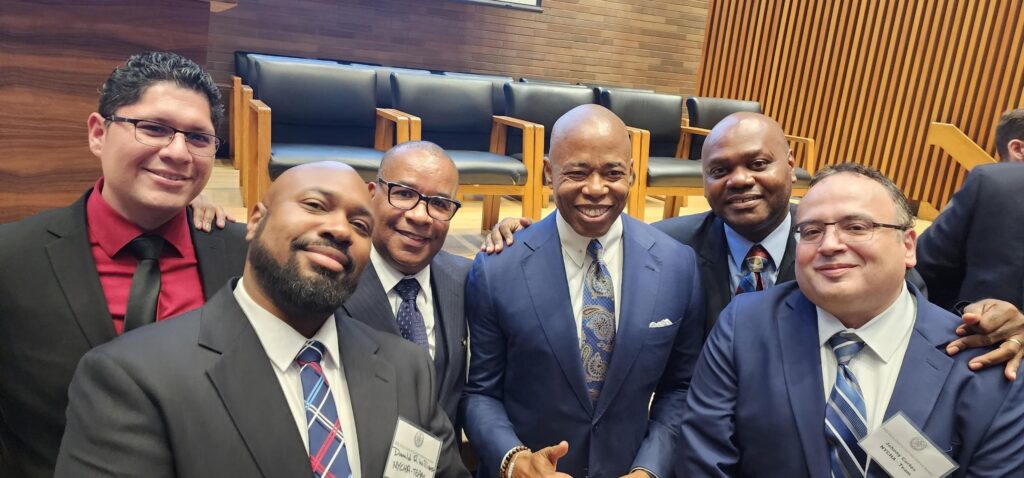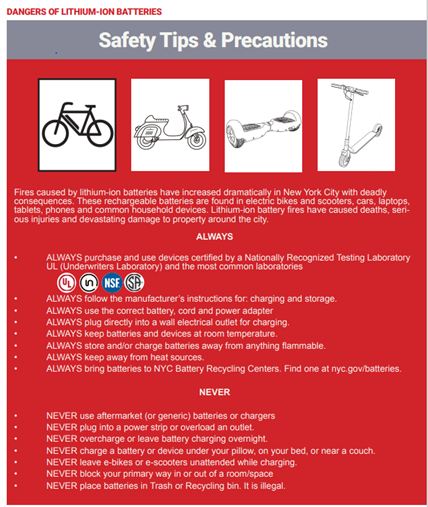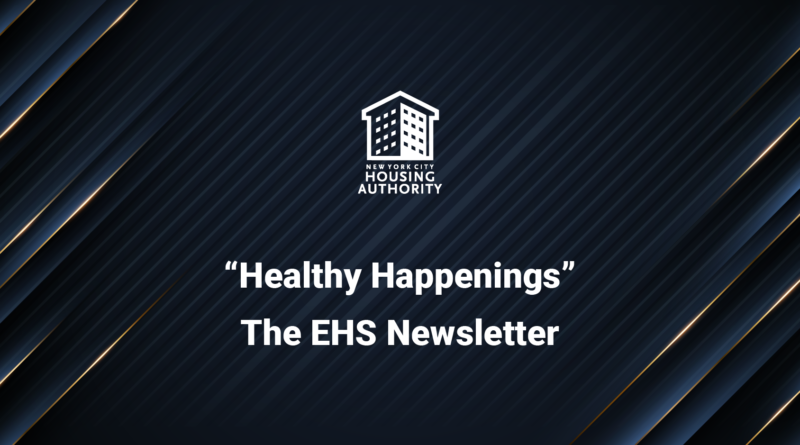Read “Healthy Happenings,” the EHS Newsletter
Promote Safe & Healthy Environments
Message from the Environmental Health & Safety Officer
Working Together to Improve Environmental Health and Safety at NYCHA
Happy New Year!
I hope this latest edition of the Environmental Health and Safety Department’s (EHS) newsletter finds you and your family well.
Because we all play a part in creating and maintaining a healthy and safe environment at NYCHA, EHS engages with residents, colleagues across the Authority, and the Federal Monitor to develop long-term solutions that address any environmental health and safety-related issues.
Working with residents is EHS’s most important collaboration. As we conduct investigations and inspections related to fire safety, heating, elevator safety, pest management, lead-based paint, indoor air quality, and mold, we want to hear directly from residents so that we can get to the root cause of an issue.
Our mission is to help one family at a time while making systemic improvements to ensure safe and healthy living conditions that are in compliance with City, State, and federal rules and regulations.
Thank you for your partnership, and stay safe,
Patrick O’Hagan, Environmental Health and Safety Officer
NYC Drinking Water
In New York City, the Department of Environmental Protection (DEP) is responsible for monitoring the city’s drinking water supply to ensure the tap water is safe, clean, and healthy. This is done by DEP scientists who test New York City’s drinking water hundreds of times each day, 365 days a year. They collect samples from the reservoirs, aqueducts, treatment facilities, and 1,000 street-side sampling stations throughout the five boroughs. As a result, New York City drinking water is world-renowned for its quality. Each day, more than 1 billion gallons of fresh, clean water is delivered from large upstate reservoirs—some more than 125 miles from the city—to the taps of nine million customers throughout New York state.
On rare occurrences, NYC residents may experience water that is brown, tastes funny, or is cloudy. These changes in water may occur for various reasons; see below and visit DEP’s website for more information.
Brown Water:
- While it is not harmful, residents should not drink obviously discolored water.
- Brown or discolored water is often related to plumbing corrosion problems inside buildings.
- If you have an ongoing problem with brown water, it may be due to rusty pipes. You should run your cold water for 2–3 minutes if it has not been used for a long period of time. This will flush the line.
- If your water suddenly looks discolored, it might be because of a disturbance to nearby water mains, including breaks or repairs. This can also happen if there is construction near your building. Additionally, the use of fire hydrants for firefighting can temporarily cause brown water.
Strange Taste or Odor:
- You may, at times, find your water tastes or smells like chlorine. DEP is required to maintain a chlorine residual in the distribution system to prevent the growth of microorganisms. Chlorine is a very effective disinfectant and is not considered hazardous or harmful in the amounts used to treat the water supply.
- Neighborhoods in New York City receive their drinking water from reservoirs of the Croton System, Catskill System, and Delaware System, or often a combination of all three. Water from the Catskill and Delaware Systems and the Croton System can taste different. This is largely because of differences in the geology, soil conditions, and naturally occurring minerals in the watersheds that surround their reservoirs.
Cloudy Water:
- Air becomes trapped in the water as it makes its long trip from the upstate reservoirs to the city. As a result, bubbles of air can sometimes cause water to appear cloudy or milky. This condition is not a public health concern. The cloudiness is temporary and clears quickly after water flows out of the tap and the extra air is released.
Submit a Concern
If you have any water quality concerns, residents are advised to call the Customer Contact Center at 718-707-7771.
If the concern is not addressed or reoccurs, residents can file a complaint with EHS so that we can investigate the matter. Visit on.nyc.gov/submit-concern to file a complaint.
NYC Mayor Eric Adams Recognizes the EHS Fire Safety Oversight Team (FSOT)
On October 6, 2022, EHS’s Fire Safety Oversight Team (FSOT) received the 2022 Excellence in Customer Service Award from the Mayor’s Office of Operations for its outstanding commitment to raising awareness about fire safety among NYCHA residents and staff.
The Fire Safety Specialists, led by Team Administrator Johnny Cortes, are certified fire safety professionals. They ensure that the Authority complies with all applicable fire safety codes, helping NYCHA staff identify and address any potential fire hazards. They also conduct inspections to verify compliance with safety mandates and oversee inspections of fire suppression systems. And they collaborate with external agencies such as NYC Emergency Management and the FDNY, providing subject matter expertise on rules, regulations, and legislation.

Lithium-Ion Battery Safety Tips from the FSOT

Healthy Start Pilot Program
EHS joined forces with NYCHA Health Initiatives to assist with the creation of the Healthy Start @ NYCHA pilot program, which connects expecting families and families with young children to resources and support from partners during this critical time of their lives.
EHS conducted in-unit environmental assessments during the pilot; the Healthy Start program will oversee repairs and corrective actions based on the inspection reports.
Residents can now let NYCHA know if your family is expecting through the Authority’s Self-Service Portal. Sharing this information will help NYCHA create safer homes for children and keep residents up to date with information and available resources. If you have any questions, please email healthy.start@nycha.nyc.gov.
Engagement
EHS’s Analysis and Engagement Unit works with the Department of Communications and the Resident Participation & Civic Engagement department to share health and safety information through resident meetings and online platforms. See below for some of those awareness campaigns from 2022…
EHS Photo Essays
Meet the EHS Integrated Pest Management Oversight Team (IPMOT)
Meet the EHS Lead Oversight Team (LOT)
Informational Awareness and Prevention Campaigns
July Is Extreme Heat Awareness Month
It’s Pollution Prevention Week
It’s National Lead Poisoning Prevention Week
It’s National Handwashing Awareness Week
Winter Season Safety Tips
- Practice fire safety: Most residential fires occur during the winter months, so don’t leave fireplaces, space heaters, food cooking on stoves, or candles unattended. Have an emergency plan and practice it regularly.
- Space heater safety: If using indoor heaters, use only electric space heaters that have the Underwriters Laboratories (UL) mark (which shows that the product has been safety tested).
- Space heaters should be at least 3 feet from anything that can burn and should always be turned off when leaving a room or going to sleep.
- Never use an extension cord with a space heater. Space heaters should be plugged directly into an outlet.
- Never use a space heater with a frayed or damaged cord, even for a small amount of time.
- Turn off the space heater if the cord becomes hot.
- Place the heater on the floor and never on a countertop or furniture.
- Young children should be kept away from any heater or appliance that has hot surfaces which can cause burns.
- Stove safety: Never use your stove, oven, or hot plate to heat your apartment – this can cause fires or the release of poisonous carbon monoxide gas.
- Smoke/carbon monoxide detectors safety: Make sure smoke and carbon monoxide detectors are working properly (change batteries if needed). If the alarms are not working, contact your property management office immediately.

